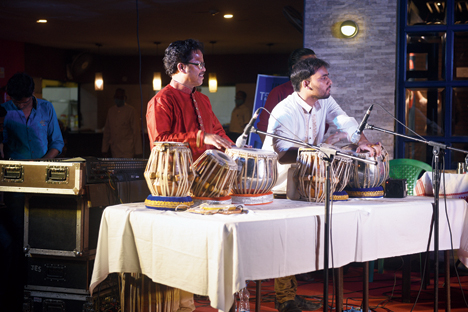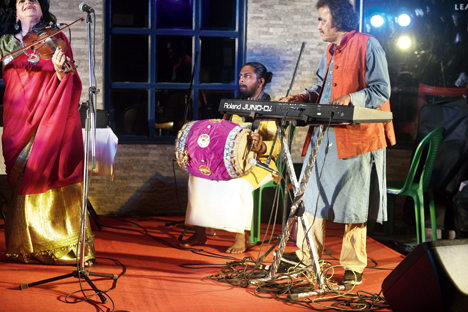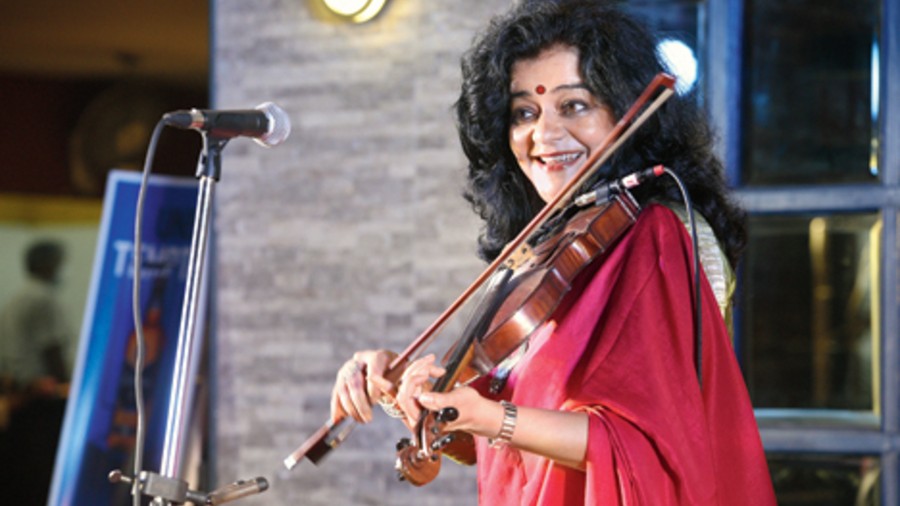On the evening of February 19, violinist Sunita Bhuyan took centre stage at The Saturday Club. The way she powered through her performance with her violin, while singing with a smile throughout, added another dimension to her show, The Saturday Club presents The Violin Concerto, in association with t2. She even shared information about what she was performing. For example, she shared details about Raga Bhimpalasi, Assamese Bihu and more. Sunita went on to sing a medley of songs. After the concert, The Telegraph chatted with the violinist who has also been an HR professional on wellness, leadership and change through the medium of music for almost 20 years.
Welcome back to Calcutta. How have you been doing this past year?
It has been different, I had to reinvent myself. I am not famous, I’m not well-known, maybe known in a few circles because I only operate in live formats and for a thinking audience. I like to leave something with them. Earlier people used to be very wary of inviting me, today they know that even a thinking artiste can entertain... I like to break these myths. I don’t have a music video, I’m not on Instagram... but this pandemic taught me that I have to go digital. I had to have Instagram to go live and now I have a sound system at home and have done 65 virtual events out of them 25 to 30 have been fundraisers for the children of sex workers, for the Don Bosco society that I work with, transgenders and for the people who have been affected by the lockdown. To provide food on the table for them was an empowering moment for us. My work in the HR space helped me thrive.

Sanjip Pal (left) and Apurba Pramanik Rashbehari Das
When and how did you learn that music promotes internal wellness?
When I did my MBA and there was this huge need, about 25 years back, when globalisation had just happened and there was a lot of foreign companies and global environmental work so that the youth and young executives needed more lateral thinking, more internalisation... they are always trying to be a part of something they are not. But you needed to make yourself reliant.
I taught things like yoga, meditation and music. It gave you that great feeling of internal well-being because it scientifically heals.
I read up and got the opportunity to work with a national brain research centre where Professor Mondol works on cognitive presentation. Then I used what I learnt in the training room as a learning enabler. The whole workshop that I did around music taught me that music has a profound lesson of leadership, of working together. A leader is best when he gives importance to everyone.
The music therapy engagements helped me to design my workshops called Sahakriya... I just designed a series on Aethetical Sustainability for Indian Institute Management in Shillong, KPMG Learning Academy...

Abhijit Debnath on dhol and Sanatan Goswami on keys Rashbehari Das
When it comes to children’s growth, do you feel that there should be a balance between studying and learning?
You’ve struck a very soft spot in me. If I had the authority, I would have banned the reality shows because you are taking away the childhood and the innocence of the child and made music a stiff competition. Music is supposed to be enjoyed, it’s a journey.
You had mentioned in the past that you have been working on research with a brain scientist. We have read that certain kinds of music played at different times of the day can repair and regenerate our brain cells.
I had started that but it hasn’t happened all the way through. Currently the research is not on but I learnt music therapy in the sense of morning ragas, afternoon ragas, evening ragas and late evening ragas which has an impact on the body. You can’t join bones through music but you can do post treatment. Your healthy cells get rejuvenated through sound therapy because you hear the sound, your brain signals to different parts of the body and then your body starts relaxing and that’s when your endorphins increase. When you’re in love or walk in a garden your endorphins increase.
You received an award from Pope Francis for your work on music therapy with underprivileged children, cancer patients and people with disability. How have such patients reacted to your therapy?
I never knew that, you know? When I used to work in this company for their CSR project for children, that’s when I learnt the power of music therapy. Fifteen years back I went to the Don Bosco street shelter to meet the children who are rehabilitated. The way they responded to the music... they had forgotten their problems... this was my first tryst with what impact music can have.
How did it make you feel?
It was overwhelming first of all and then there was a realisation. One the power of the crux. See, it’s always entertainment whether you’re a classical artiste or you’re playing and people are cheering. But this is a different platform altogether, different interaction, where you can give people, with such difficult lives, at least two hours of relief.
Do you recognise yourself as a music therapist?
Professionally I am not a music therapist. Professionally I am a leadership trainer and I use music for leadership-partnership change and for the children’s engagement. I use the concepts of music therapy as a tool. I don’t go to centres to heal. I like to travel, meet and play and break the myth... break the myth of academics.











